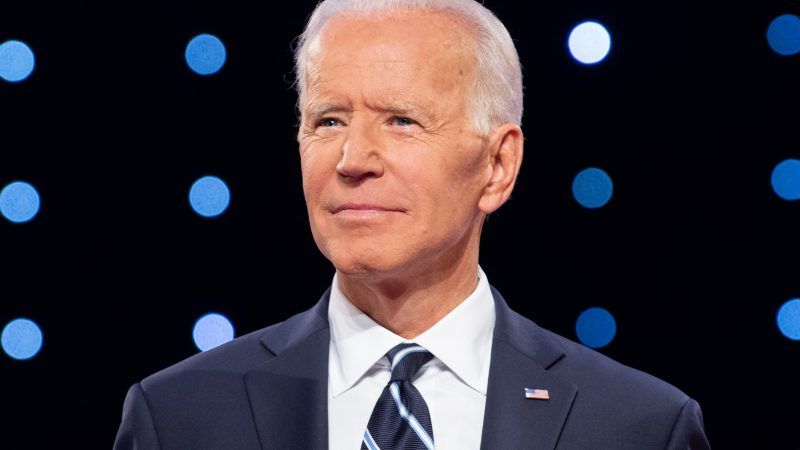Biden Says He Supports the Trans-Pacific Partnership, And Also Does Not Support the Trans-Pacific Partnership
Is he trying to find a middle ground as Dems divide on trade? Or is he just talking gibberish?

Former Vice President Joe Biden said during Wednesday's Democratic debate that he would not try to re-insert the United States into the Trans-Pacific Partnership (TPP), the 12-nation trade deal that the Obama administration was unable to finalize before leaving office.
But Biden did voice support for the idea of a trade deal that would bring together American allies as leverage against China—which was basically the goal of the TPP.
"I would not rejoin as it was originally put forward," Biden said, though he also said he would "join with the 40 percent of the world that was with us [in the TPP]."
"That's what we have to do. Otherwise [China is] going to write the rules of the road," the former vice president said Wednesday.
Biden's answer on TPP was not entirely coherent—at one point, he referred to the pact deal as the "TTP"—but it does appear to be a pretty significant retreat from the unabashedly pro-TPP stance he took as President Barack Obama's second-in-command. Through 2016, Biden was still acting as the chief cheerleader for the trade deal, and he was deployed to coax Democrats to support a bill authorizing the administration to enter a final round of negotiations for the deal.
Part of his shift is an acknowledgment that politics have changed since 2008, when the TPP was first proposed. The TPP became politically toxic on both sides of the aisle during the 2016 campaign, as Trump's anti-trade views swamped the previously TPP-friendly Republican Party, while Sanders' opposition to the deal eventually convinced Hillary Clinton to change positions and oppose it too. One of Trump's first actions after being inaugurated was to yank America out of the TPP negotiations; the other 12 countries eventually finalized a deal that does not include the U.S.
Still, polls show that most Americans support free trade as a concept and believe that the North American Free Trade Agreement (NAFTA) and other trade deals have made the country better off.
Another way to view Biden's answers on Wednesday is as an attempt to find a middle ground between the two factions on trade policy that appear to be emerging within the 20-plus candidate Democratic field. In Tuesday's debate, clear lines were drawn between progressive candidates ,like Sens. Bernie Sanders (I–Vt.) and Elizabeth Warren (D–Mass.), who are vocally skeptical of trade deals like the TPP and NAFTA, and more moderate candidates, like former congressmen Beto O'Rourke and John Delaney, who say they would reverse Trump's anti-trade policies.
The TPP itself never came up for a vote in Congress, but a bill granting the Obama administration the authority to negotiate the deal—technically known as "Trade Promotion Authority"—did. Both Warren and Sanders voted against granting that authority. During Tuesday's debate, both stuck to their guns and bragged to the crowd about that vote.
Biden's retreat on TPP, even if only a minor one, would appear to be a victory for the anti-trade half of the Democratic field.


Show Comments (10)